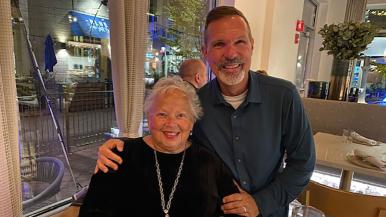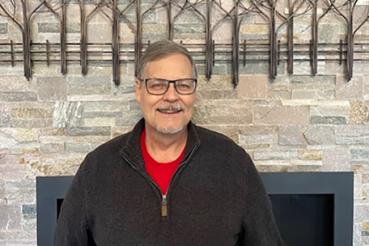Rich K. has been a caregiver for more than six years. He also works full time.
“Between caregiving and working, I’m spread pretty thin,” he says. “It’s a demanding schedule on both ends.”
Rich’s wife is a six-year survivor of ovarian cancer. Married for 18 years, they have a cat, a small circle of close family and friends and “the best neighbors in the world.”
A demanding schedule
As her caregiver, Rich takes his wife to appointments, makes sure she is comfortable and helps out around the house, doing dishes and laundry.
Every third Monday, he drives her from their home in Plainfield to a hospital in Chicago for treatment. His job requires him to drive to Chicago as well. He works a 12-hour night shift — 6 p.m. to 6 a.m. — which gives him seven days off out of every 14 and allows him to spend more time with his wife. She took an early retirement due to her illness and treatments.
When his wife was first diagnosed in 2015, he was not ready for it. But he chose to be her caregiver.
“She’s always been there for me,” he says.
“Being a caregiver is demanding, but I’ve done OK,” he says. “You can get angry at the situation, but that doesn’t help.”
Finding support
Rich attends the caregivers support group at Waterford Place Cancer Resource Center when he can. His wife suggested he attend, saying it could benefit him or perhaps he could help someone else. The Family and Caregiver Networking Group meets on the second Wednesday of each month, from 6:30 to 8 p.m. It is open to family, friends and caregivers of cancer patients to receive support and network with others in similar circumstances.
Although conflicts with his work schedule sometimes prevent him from attending, he finds the support group helpful.
“I’ve met some fantastic people,” he says. “The support group has given me the ability to gain perspective and support from others, share our stories and discuss how we cope with our roles as caregivers.
“Everyone is dealing with the same thing, caring for their spouse or a parent or a sibling. There are a lot of other people with the same challenges. Sometimes their loved one is in a nursing home. Sometimes, that person lives with them. It’s interesting to see what they’re all dealing with. It helps to hear their stories.”
Helping others
He is also grateful for the opportunity to share his story and help others.
He recalls when a woman attended the group session for the first time. She was afraid and hesitant to participate. When she did, it was very emotional and she broke down.
“It helps to see you’re not alone, that other people are dealing with similar things,” Rich says. “It’s very helpful.”




